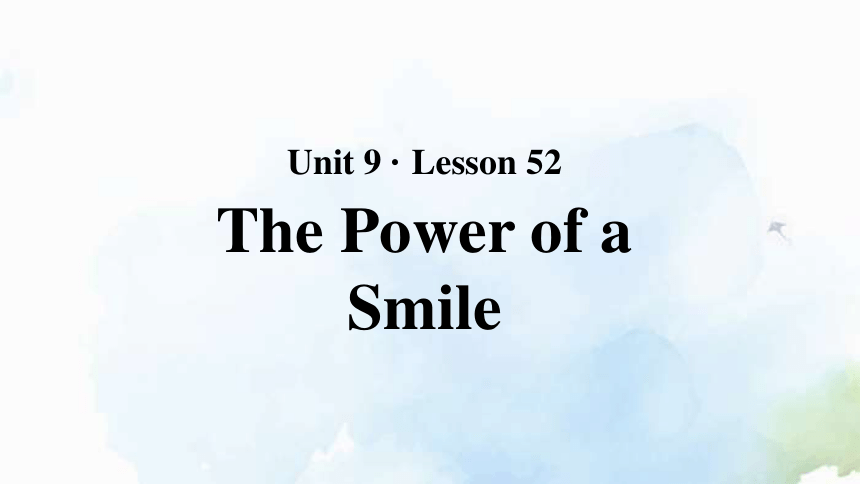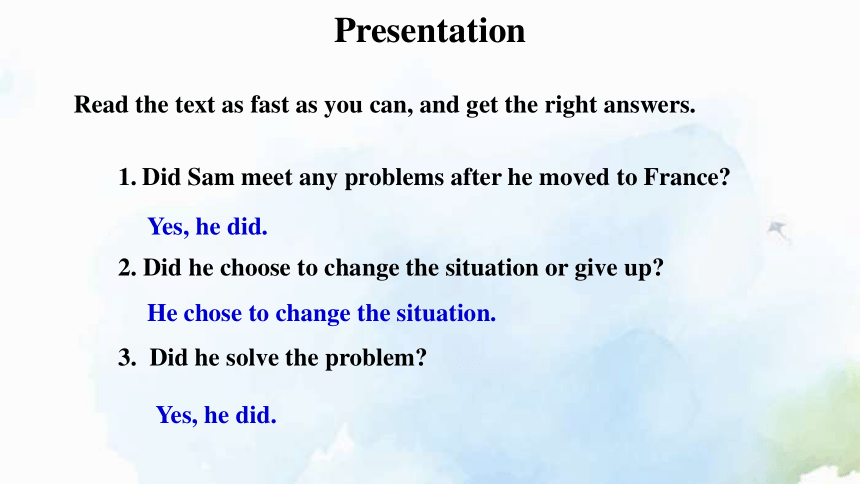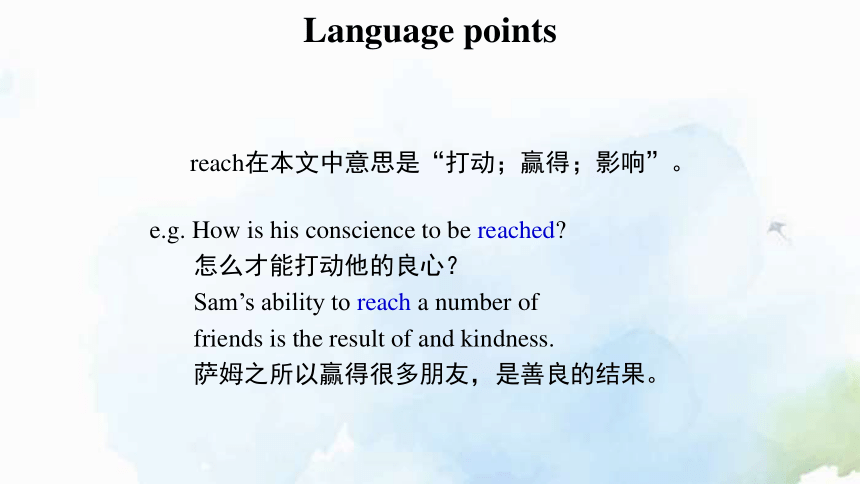Unit 9 Lesson 52 The Power of a Smile 课件(33张PPT)
文档属性
| 名称 | Unit 9 Lesson 52 The Power of a Smile 课件(33张PPT) |  | |
| 格式 | pptx | ||
| 文件大小 | 1.1MB | ||
| 资源类型 | 教案 | ||
| 版本资源 | 冀教版 | ||
| 科目 | 英语 | ||
| 更新时间 | 2020-05-11 11:43:45 | ||
图片预览












文档简介
(共33张PPT)
Unit 9 · Lesson 52
The Power of a Smile
Can you smile
Have you smiled today
Warm up
difficulty
困难
New words
dining
用餐
New words
simply
只是
New words
somehow
以某种方式(方法)
New words
adapt
改编,适应
New words
universal
全世界的,
普遍的,
通用的,
Where is it
New words
He is Sam. He’s from England, but he moved to France last month.
Guess: Can he adapt France
New words
Read the text as fast as you can, and get the right answers.
Did Sam meet any problems after he moved to France
2. Did he choose to change the situation or give up
3. Did he solve the problem
Yes, he did.
He chose to change the situation.
Yes, he did.
Presentation
part 或 a part表示一部分。
e.g. This is (a) part of the book.
这是那本书的一部分。
He lost (a) part of his books.
他丢了一部分书。
Language points
e.g. How is his conscience to be reached
怎么才能打动他的良心?
Sam’s ability to reach a number of
friends is the result of and kindness.
萨姆之所以赢得很多朋友,是善良的结果。
reach在本文中意思是“打动;赢得;影响”。
Language points
arrive, get , reach
arrive, get和reach均有“到达”之意。
当表示到达某地时,它们的用法分别如下:
1. arrive at / in + 地点名词(小地点常用at,大
地点常用in)
2. get to + 地点名词
3. reach + 地点名词
Language points
somehow “不管怎样”。
e.g. We have to arrive there before eight o’clock somehow.
我们无论如何必须八点钟前到。
somehow还有“不知道怎么的”的意思。
e.g. At that moment, I couldn’t remember anything, somehow.
在那一刻,不知怎么的,我什么都想不起来了。
Language points
adapt “适应”,可用作及物动词,后跟宾语或复合宾语,也可用作不及物动词。表示“适应……”,要搭配介词to。
e.g. He must adapt himself to the new situation.
他必须适应新形势。
notice作动词时,意为“注意到;察觉到”,后面可跟名词或代词作宾语。
e.g. I noticed her looking into the window.
我注意到她正在往窗子里看。
Language points
notice sb. do sth.表示“注意到某人做某事(的全过程)”;notice sb. doing sth.表示“注意到某人正在做某事”。
e.g. Did you notice her walk into the library
你注意到她走进教室了吗?
I noticed my sister is reading English.
我注意到了我姐姐正在读英语。
此外,notice后可跟从句。
e.g. He noticed that the old man left the
classroom early.
他注意到这个老人很早就离开了教室。
Language points
notice用作名词,“布告;通知”时,是可数名词;意为“注意”时,是不可数名词。
e.g. Here is a notice. It says “No Park”.
这是一个通知。它写着“禁止停车”。
A sound caught the teacher’s notice.
一个声音吸引了老师的注意。
Language points
join有“参加,加入”之意,既可以作及物动词,也可以作不及动物词。
join作及物动词时,后接sb.意为“加入某人(一起做某事)”,接sth.则意为“加入某组织成为其成员”。join sb. in sth. / doing sth.意为“与……一起从事某活动”。
e.g. She joined the school half a year.
她来学校半年了。
Our music teacher joined a health club.
我们的音乐老师加入了一个健康俱乐部。
Language points
Would you join us in the run
你愿意和我们一起跑步吗?
join作不及物动词时,可与in组成短语,表示参加某项活动。
e.g. Can I join in your group
我能参加你们组吗?
Language points
join与join in的区别:join指“参加某个组织、参加到某个人群中而成为其中的一员”,而join in一般表示参加竞赛、娱乐、游戏等活动。
e.g. We joined the healthy Club last month.
我们上个月参加了这个健康俱乐部。
Why doesn’t David join in the exam
为什么 大卫没有参加考试?
Language points
take part in 和 join
take part in和join都可表示“参加”,区别如下:
take part in侧重指参加群众性活动等,着重说明句子主语参加该项活动并在活动中发挥作用。
e.g. Lots of students took part in the May 4th Movement (运动).
许多学生参加了五四运动。
Language points
join侧重指加入某个党派、团体组织等,成为其成员之一;join也可以表示和某人一起做某事,其结构为:join sb. for sth.,join sb. in doing sth.。
e.g. When did your brother join the football team
你的哥哥什么时候加入足球队的?
Will you join us for dinner
你要和我们一起吃晚饭吗?
Language points
Read and put the sentences in the correct order.
( ) Sam was really lonely in his new school.
( ) Sam was worried before he arrived in France.
( ) When Sam smiled at another student, he received a warm smile back.
( ) Sam tried his best to find a way to change the situation.
( ) Sam was invited to have lunch with a group of students.
Practice
Read and put the sentences in the correct order.
( ) Sam was really lonely in his new school.
( ) Sam was worried before he arrived in France.
( ) When Sam smiled at another student, he received a warm smile back.
( ) Sam tried his best to find a way to change the situation.
( ) Sam was invited to have lunch with a group of students.
2
1
4
3
5
Practice
Complete each passage using the information from the list below.
A. since primary school
B. for six weeks
C. who seems nice and friendly
D. what to do
E. the students are a close group
Practice
I’ve been at my new school ____ and I still haven’t made any friends. I’ve joined clubs, but I usually end up alone at the club while other kids gather in small groups. I don’t know who to talk to or ____.
This is the perfect question for me to answer because I have changed schools six times ____ and have had to make new friends each time! Yes, it’s always hard to make new friends in a new school because ____. Well, here’s how I usually do it – find a person ____. Start a conversation with that person. I find this works very well. Good luck!
B
D
A
E
C
Practice
Discuss:
Have you ever felt lonely Why
How can you make new friends
Practice
Group work:
Imagine you moved into another place last month, make a new dialogue.
Practice
Have you ever had to adapt to a new environment
How did you adapt to it Interview your group members.
Task tips:
If “Yes”, what did you do to adapt to it Did you try any of these ways
● Smile at others.
● Make friends.
● Communicate well.
● Take part in group activities.
Practice
Give us some suggestions about adapt to new environment.
Practice
Do you know the saying about smile
Live with a smile , we will have unexpected harvest.
微笑地面对生活,我们将会有意想不到的收获。
Practice
1. Listen and read.
2. Finish exercises of this lesson.
3. Write a short passage about your experience in a new environment.
Homework
再 见
Unit 9 · Lesson 52
The Power of a Smile
Can you smile
Have you smiled today
Warm up
difficulty
困难
New words
dining
用餐
New words
simply
只是
New words
somehow
以某种方式(方法)
New words
adapt
改编,适应
New words
universal
全世界的,
普遍的,
通用的,
Where is it
New words
He is Sam. He’s from England, but he moved to France last month.
Guess: Can he adapt France
New words
Read the text as fast as you can, and get the right answers.
Did Sam meet any problems after he moved to France
2. Did he choose to change the situation or give up
3. Did he solve the problem
Yes, he did.
He chose to change the situation.
Yes, he did.
Presentation
part 或 a part表示一部分。
e.g. This is (a) part of the book.
这是那本书的一部分。
He lost (a) part of his books.
他丢了一部分书。
Language points
e.g. How is his conscience to be reached
怎么才能打动他的良心?
Sam’s ability to reach a number of
friends is the result of and kindness.
萨姆之所以赢得很多朋友,是善良的结果。
reach在本文中意思是“打动;赢得;影响”。
Language points
arrive, get , reach
arrive, get和reach均有“到达”之意。
当表示到达某地时,它们的用法分别如下:
1. arrive at / in + 地点名词(小地点常用at,大
地点常用in)
2. get to + 地点名词
3. reach + 地点名词
Language points
somehow “不管怎样”。
e.g. We have to arrive there before eight o’clock somehow.
我们无论如何必须八点钟前到。
somehow还有“不知道怎么的”的意思。
e.g. At that moment, I couldn’t remember anything, somehow.
在那一刻,不知怎么的,我什么都想不起来了。
Language points
adapt “适应”,可用作及物动词,后跟宾语或复合宾语,也可用作不及物动词。表示“适应……”,要搭配介词to。
e.g. He must adapt himself to the new situation.
他必须适应新形势。
notice作动词时,意为“注意到;察觉到”,后面可跟名词或代词作宾语。
e.g. I noticed her looking into the window.
我注意到她正在往窗子里看。
Language points
notice sb. do sth.表示“注意到某人做某事(的全过程)”;notice sb. doing sth.表示“注意到某人正在做某事”。
e.g. Did you notice her walk into the library
你注意到她走进教室了吗?
I noticed my sister is reading English.
我注意到了我姐姐正在读英语。
此外,notice后可跟从句。
e.g. He noticed that the old man left the
classroom early.
他注意到这个老人很早就离开了教室。
Language points
notice用作名词,“布告;通知”时,是可数名词;意为“注意”时,是不可数名词。
e.g. Here is a notice. It says “No Park”.
这是一个通知。它写着“禁止停车”。
A sound caught the teacher’s notice.
一个声音吸引了老师的注意。
Language points
join有“参加,加入”之意,既可以作及物动词,也可以作不及动物词。
join作及物动词时,后接sb.意为“加入某人(一起做某事)”,接sth.则意为“加入某组织成为其成员”。join sb. in sth. / doing sth.意为“与……一起从事某活动”。
e.g. She joined the school half a year.
她来学校半年了。
Our music teacher joined a health club.
我们的音乐老师加入了一个健康俱乐部。
Language points
Would you join us in the run
你愿意和我们一起跑步吗?
join作不及物动词时,可与in组成短语,表示参加某项活动。
e.g. Can I join in your group
我能参加你们组吗?
Language points
join与join in的区别:join指“参加某个组织、参加到某个人群中而成为其中的一员”,而join in一般表示参加竞赛、娱乐、游戏等活动。
e.g. We joined the healthy Club last month.
我们上个月参加了这个健康俱乐部。
Why doesn’t David join in the exam
为什么 大卫没有参加考试?
Language points
take part in 和 join
take part in和join都可表示“参加”,区别如下:
take part in侧重指参加群众性活动等,着重说明句子主语参加该项活动并在活动中发挥作用。
e.g. Lots of students took part in the May 4th Movement (运动).
许多学生参加了五四运动。
Language points
join侧重指加入某个党派、团体组织等,成为其成员之一;join也可以表示和某人一起做某事,其结构为:join sb. for sth.,join sb. in doing sth.。
e.g. When did your brother join the football team
你的哥哥什么时候加入足球队的?
Will you join us for dinner
你要和我们一起吃晚饭吗?
Language points
Read and put the sentences in the correct order.
( ) Sam was really lonely in his new school.
( ) Sam was worried before he arrived in France.
( ) When Sam smiled at another student, he received a warm smile back.
( ) Sam tried his best to find a way to change the situation.
( ) Sam was invited to have lunch with a group of students.
Practice
Read and put the sentences in the correct order.
( ) Sam was really lonely in his new school.
( ) Sam was worried before he arrived in France.
( ) When Sam smiled at another student, he received a warm smile back.
( ) Sam tried his best to find a way to change the situation.
( ) Sam was invited to have lunch with a group of students.
2
1
4
3
5
Practice
Complete each passage using the information from the list below.
A. since primary school
B. for six weeks
C. who seems nice and friendly
D. what to do
E. the students are a close group
Practice
I’ve been at my new school ____ and I still haven’t made any friends. I’ve joined clubs, but I usually end up alone at the club while other kids gather in small groups. I don’t know who to talk to or ____.
This is the perfect question for me to answer because I have changed schools six times ____ and have had to make new friends each time! Yes, it’s always hard to make new friends in a new school because ____. Well, here’s how I usually do it – find a person ____. Start a conversation with that person. I find this works very well. Good luck!
B
D
A
E
C
Practice
Discuss:
Have you ever felt lonely Why
How can you make new friends
Practice
Group work:
Imagine you moved into another place last month, make a new dialogue.
Practice
Have you ever had to adapt to a new environment
How did you adapt to it Interview your group members.
Task tips:
If “Yes”, what did you do to adapt to it Did you try any of these ways
● Smile at others.
● Make friends.
● Communicate well.
● Take part in group activities.
Practice
Give us some suggestions about adapt to new environment.
Practice
Do you know the saying about smile
Live with a smile , we will have unexpected harvest.
微笑地面对生活,我们将会有意想不到的收获。
Practice
1. Listen and read.
2. Finish exercises of this lesson.
3. Write a short passage about your experience in a new environment.
Homework
再 见
同课章节目录
- Unit 7 Work for Peace
- Lesson 37 Don't Fight!
- Lesson 38 Making School a Better Place
- Lesson 39 The Dove and the Olive Branch
- Lesson 40 The UN—Power of Words
- Lesson 41 Jenny's Good Advice
- Lesson 42 Peace at Last
- Unit Review
- Unit 8 Culture Shapes Us
- Lesson 43 A Visit to Chinatown
- Lesson 44 Popular Sayings
- Lesson 45 Different Manners
- Lesson 46 Home to Many Cultures
- Lesson 47 Good Manners
- Lesson 48 Supper with the Bradshaws
- Unit Review
- Unit 9 Communication
- Lesson 49 Get Along with Others
- Lesson 50 Tips for Good Communication
- Lesson 51 What Could Be Wrong?
- Lesson 52 The Power of a Smile
- Lesson 53 Working in Groups
- Lesson 54 How Embarrassing!
- Unit Review
- Unit 10 Get Ready for the Future
- Lesson 55 Look into the Future
- Lesson 56 Manage Your Time
- Lesson 57 Best Wishes
- Lesson 58 Ms.Liu's Speech
- Lesson 59 Keep Your Choices Open
- Lesson 60 Get a Good Education
- Unit Review
